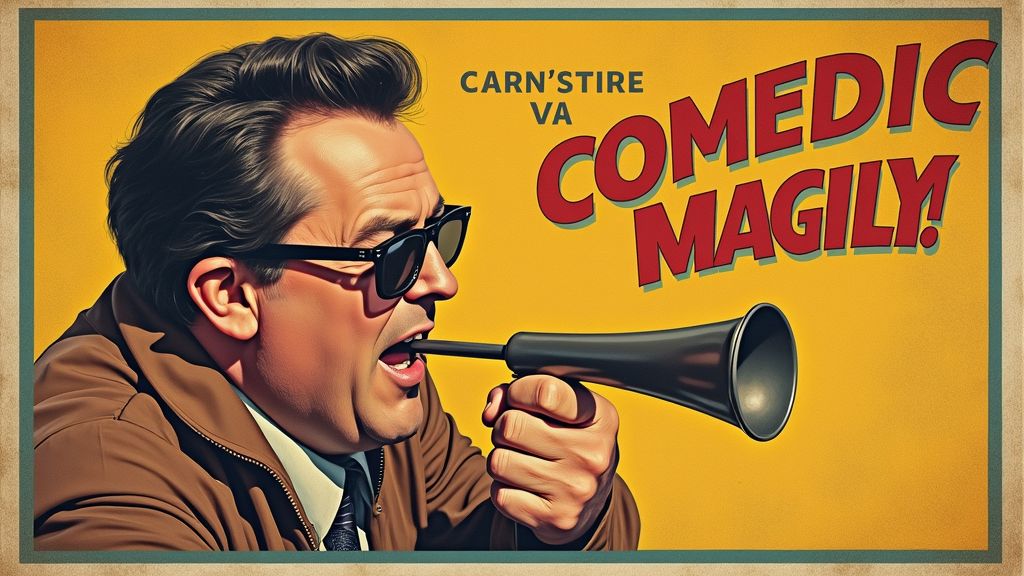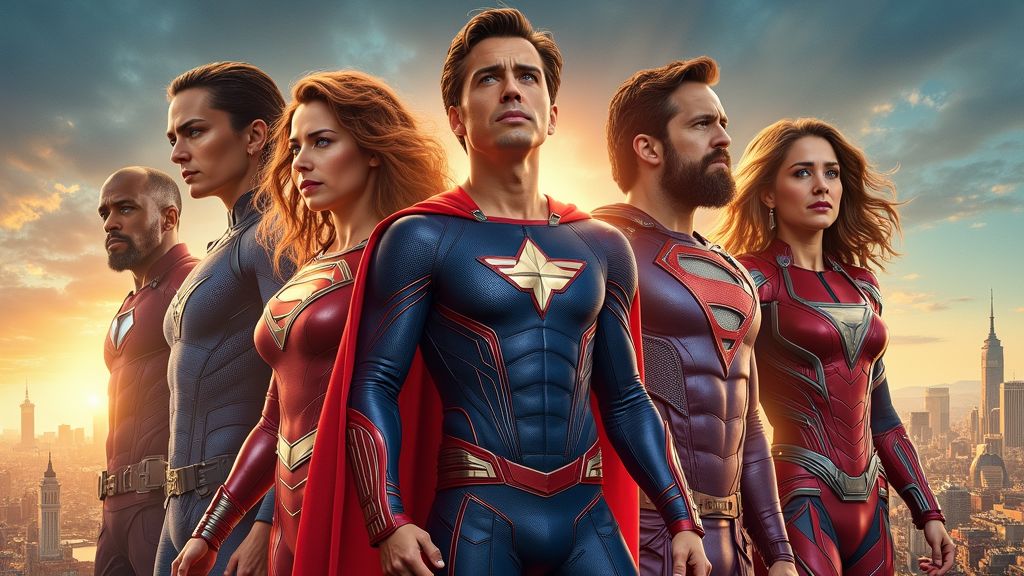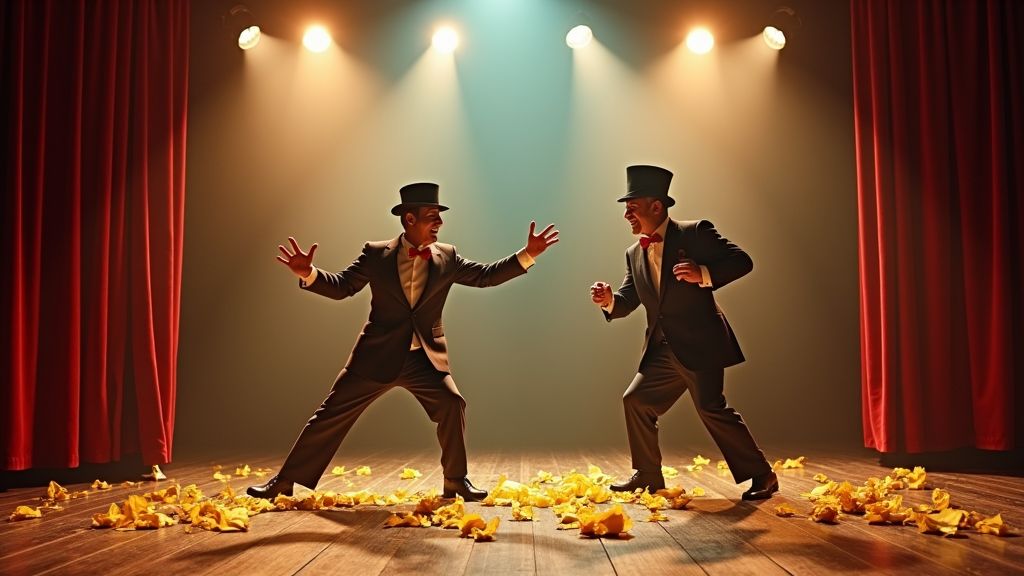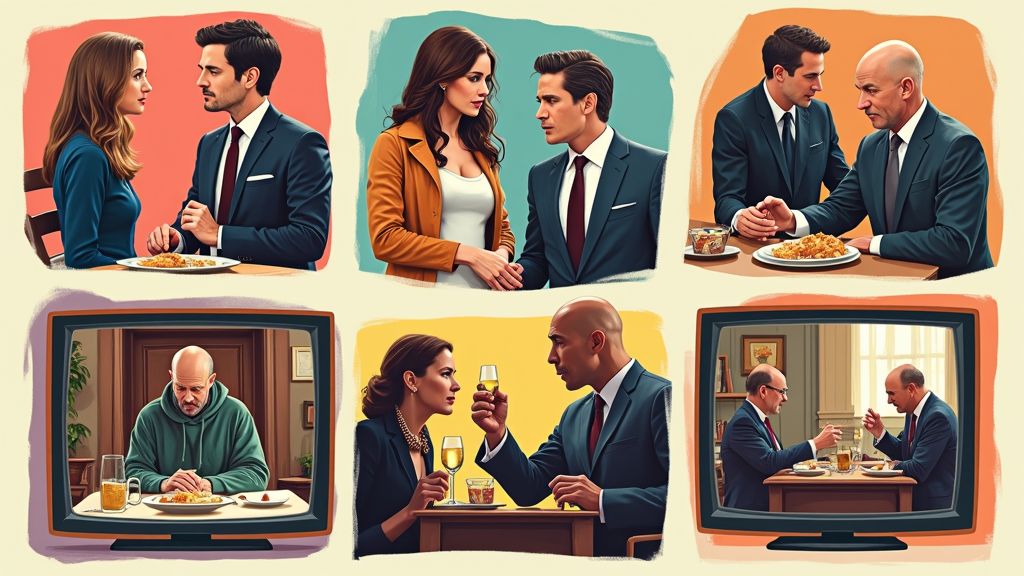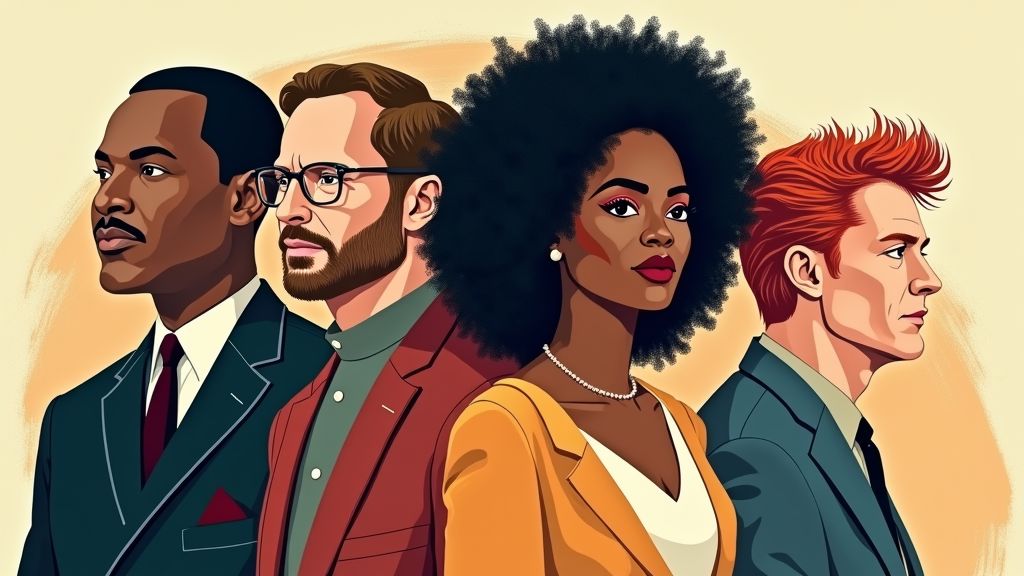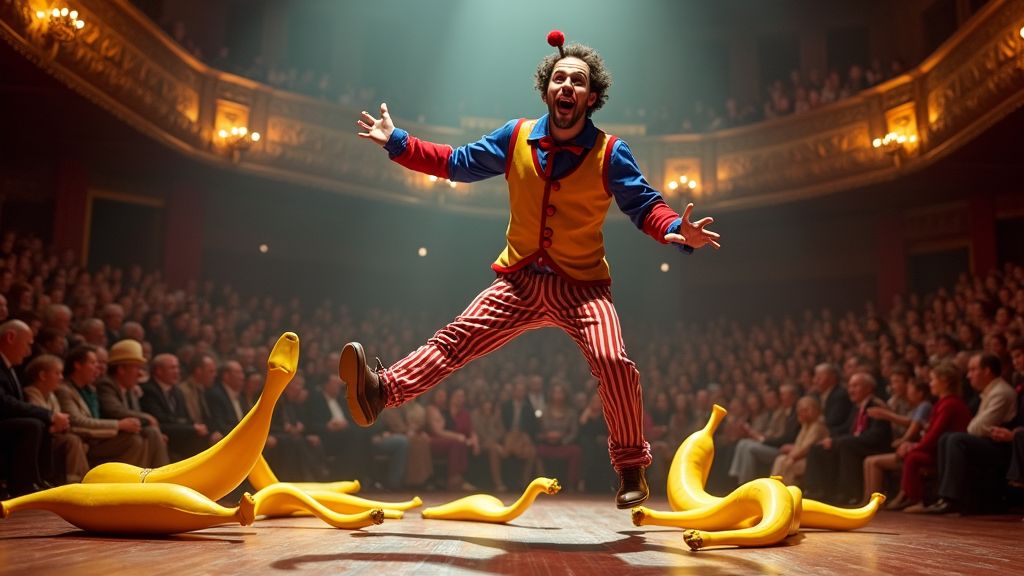Advertisement
Entertainment
Top 10 Classic Comedies That Still Make Us Laugh Today
We all love a good laugh, don’t we? It’s the best medicine, they say, and with all the hustle and bustle of our daily lives, who couldn’t use a hearty chuckle now and then? In the world of cinema, there are timeless classics that have been lifting our spirits for decades. Whether it’s a rainy day indoors or a cozy family night, these classic comedies never fail to bring a smile to our faces. Today, let’s take a dive into the top 10 classic comedies that still tickle our funny bones, offering not only laughter but some refreshing outlooks on situations that might just seem all too familiar.
The Timeless Appeal of Classic Comedies
Ever wonder why we keep going back to these oldies but goodies? The thing about classic comedies is that, no matter how much time has passed, they just seem to have this magical ability to stay relevant. They tap into universal themes of love, misunderstanding, and human folly – things that never really go out of style. And perhaps, at their core, they remind us that it’s okay to laugh at life and, most importantly, at ourselves.
In many ways, these comedies become a mirror of our daily existence. We often see exaggerated versions of our own awkward or humorous experiences when characters trip over themselves, misinterpret a situation, or find themselves in the midst of comedic chaos. Such timeless humor helps anchor us to the past as we begin to see that human nature hasn’t really changed all that much. Our grandparents laughed at the same comedic tropes that still make us giggle today. The concept of slipping on a banana peel or getting into embarrassing misunderstandings is just as funny now as it was decades ago – proof that laughter is indeed universal.
Furthermore, classic comedies offer a safe way to explore social, political, and cultural norms of the time they were created. By watching how humor was used to critique societal structures or poke fun at authority figures, we gain a glimpse into different eras and how they handled their issues. Of course, we also find that many of these issues haven’t disappeared; they’ve only transformed or taken on a more modern flavor. This is part of the reason these films remain fascinating to new generations. While the fashions, accents, and slang might be different, the underlying comedic tension often feels surprisingly current.
These movies also carry an educational value. For aspiring filmmakers, comedians, writers, or cultural historians, classic comedies provide lessons in comedic timing, scriptwriting, and character development. There’s something to be said for studying the art of how a movie from the 1930s, ‘50s, or ‘80s elicited laughs across multiple generations. This archival knowledge can be invaluable for those seeking to recreate or reinvent comedic formulas in modern cinema or other forms of media. Whether it’s a heartfelt, family-friendly style or sharp satire, classic comedies have paved the way for innovative storytelling.
All in all, their timeless appeal rests not just on nostalgia but on their ability to remain relatable and emotionally resonant. We might enter these films anticipating old-fashioned jokes, but we leave marveling at how relevant and touching many of the comedic situations still are. After all, the best comedy is grounded in truth, and these stories shine a humorous light on the small truths of everyday life.
The Top Picks
Let’s jump right into our list of the best picks that still have audiences laughing today. While there are countless other delightful classics, these 10 remain go-to examples of comedic brilliance. Each entry represents a unique angle on humor – from slapstick and satire to romantic banter and philosophical wit. If you haven’t seen them, you’re in for a treat; and if you have, it’s always worth another watch.
- Some Like It Hot (1959) – Featuring Marilyn Monroe, Tony Curtis, and Jack Lemmon, this comedy brilliantly disguises crime with humor. The story of two musicians on the run, disguised as women, brings a delightful mix of romance and fun. According to AFI, it still holds a spot in the top 100 films.
Directed by the legendary Billy Wilder, Some Like It Hot stands out for a multitude of reasons beyond its star-studded cast. One of the film’s strongest qualities is its blend of genres – it begins almost like a gangster movie before quickly morphing into a hilarious tale of mistaken identities. Audiences of the time were hooked by the scandalous cross-dressing premise, but they stayed for the genuine comedic chemistry among the leads. From the moment Tony Curtis and Jack Lemmon don women’s clothing to avoid the mob, the comic potential is endless. Watching them try to keep their secret from the all-female band they join highlights cultural norms of the 1950s in an amusing light. Meanwhile, Marilyn Monroe’s performance adds a layer of romantic tension, proving that comedic stories often hold deeper emotional or cultural insights.
Despite its vintage label, the humor in Some Like It Hot is still refreshing. Its themes of identity, attraction, and survival in unusual circumstances continue to resonate. Even today, many comedic films will pay homage to the outrageous setups first showcased here, confirming its place in Hollywood history as one of the most iconic comedies of all time. If you watch it for the first time, you’ll soon see why it’s beloved by film buffs and novices alike.
- Monty Python and the Holy Grail (1975) – Who could forget the surreal comedy troupe that catapulted absurdity to legendary status? From knights who “say Ni” to the outrageously silly tasks, this film is lauded by Rotten Tomatoes for its timeless wit and slapstick humor.
The Monty Python troupe – Graham Chapman, John Cleese, Terry Gilliam, Eric Idle, Terry Jones, and Michael Palin – forever transformed the comedic landscape with their irreverent style. Monty Python and the Holy Grail turned the legend of King Arthur on its head, infusing the timeless quest narrative with gags involving killer rabbits, non-existent horses (coconuts, anyone?), and arguments about how one might determine the flight speed of an unladen swallow. This film’s genius lies in its unpredictability. You never know which absurd comedic element will appear next, or how the troupe will dismantle the fourth wall to comment on the story itself.
But beneath the absurdity, there is a clever commentary on historical epics and the notion of heroism. By drawing attention to the tropes and cliches of medieval romances, the Pythons effectively dismantle them through comedic exaggeration. To this day, quotes like, “We are the knights who say Ni!” and “It’s just a flesh wound,” stand as iconic lines recognized even by those who’ve never seen the movie. The comedic timing and group chemistry are unparalleled, which is why their influence echoes in countless modern comedies, whether on television, stage, or film. For many, Monty Python and the Holy Grail marks the gold standard of British comedy.
- Airplane! (1980) – The absurdity of airplane disaster films reached its peak with this one. Its rapid-fire pace of visual and verbal puns is a masterclass in comedic timing and continues to influence modern comedy films.
Written and directed by Jim Abrahams, David Zucker, and Jerry Zucker, Airplane! set the bar for parody films. Even if you’ve never watched a single disaster flick, the humor in Airplane! remains outrageously entertaining. The film spoofs 1970s disaster movies, especially Zero Hour!, with deadpan delivery of ridiculous lines—“I am serious. And don’t call me Shirley.”—which has since become part of popular culture. This comedic gem excels because it never takes a breath from the jokes; each scene is jam-packed with sight gags, puns, and self-aware nods to airline disaster clichés.
While Airplane! relies heavily on silly humor, there’s a sense of intelligence behind every joke. Much of the film’s charm lies in its commitment to the bit—actors like Leslie Nielsen and Robert Hays deliver outlandish lines with absolute seriousness, making each gag doubly funny. Modern parodies and comedies still borrow the rapid-fire approach that Airplane! perfected. It’s safe to say if you’re in need of a comedic flight of fancy, this one is your ticket to stress relief. Even upon multiple viewings, you’ll likely notice new details in the background that add to its comedic layers.
- Blazing Saddles (1974) – An uproarious satire of Western movies directed by Mel Brooks, tackling controversial themes with laughter. This film broke new ground humor-wise and is still considered a masterpiece.
Mel Brooks is synonymous with comedic genius, and Blazing Saddles stands among his crowning achievements. From the opening credits to the finale, the film relentlessly pokes fun at racism, political corruption, and the Western film genre itself. By doing so, Brooks holds a mirror to the prejudices of society in a way that only comedy can manage—making us laugh, cringe, and ultimately reflect. It’s a testament to Brooks’ fearless approach to satire that Blazing Saddles remains as bold today as it did in the 1970s.
Among the film’s highlights are the performances of Cleavon Little as Bart, the first Black sheriff of Rock Ridge, and Gene Wilder as the Waco Kid. Their comedic partnership anchors the film, balancing the outrageous gags and slapstick. Brooks also invites audiences to break the fourth wall more than once, particularly in an unforgettable sequence involving a studio lot brawl that quite literally spills off the set. Although some of the humor can feel edgy by today’s standards, it remains an important cultural artifact for how comedy can be weaponized against bigotry. It’s a reminder that sometimes, pointing and laughing at the absurdity of prejudice is a crucial step toward dismantling it.
- The Pink Panther (1963) – Inspector Clouseau’s bumbling antics have inspired remakes, but nothing beats the original’s charm. It’s these clues (and lack thereof) in solving a diamond theft that unfurls the humor.
Blake Edwards’ The Pink Panther introduced the world to Inspector Jacques Clouseau, brilliantly played by Peter Sellers. Clouseau’s earnest yet hilariously incompetent approach to detective work immediately won over audiences. Each scene sees him stumbling—sometimes literally—through his investigations. The comedic tension arises from how close he occasionally comes to solving the case, only to bungle it last minute with a misstep or misguided assumption.
This original film also gave birth to the iconic Pink Panther animated character that appears in the title sequence, a piece of cartoon artistry that has become synonymous with sly, jazzy comedic style. While the sequels and remakes attempt to capture the same spark, there’s something irresistibly timeless about the 1963 classic. The comedic set pieces—such as Clouseau getting entangled with elaborate contraptions—serve as a blueprint for comedic detective stories in future films. Even if you’re used to more contemporary comedic mysteries, you’ll find plenty to love (and laugh at) with the Pink Panther’s original debut.
- Groundhog Day (1993) – What would you do if you lived the same day repeatedly? Bill Murray shows us in this thoughtful comedy. It’s a philosophical jaunt spiced with humor that speaks to the repetitiveness of the human condition.
Harold Ramis directed this quietly profound comedy that transcends mere laughs to offer a meditation on life, redemption, and personal growth. Bill Murray plays Phil Connors, an arrogant weatherman stuck reliving February 2nd over and over in the small town of Punxsutawney. While at first, Phil indulges in mischief and hedonism, eventually he’s forced to confront his behavior, reevaluate his outlook, and become a better person. The comedic touch keeps the film from becoming heavy-handed, and Murray’s sarcastic wit is perfectly balanced by Andie MacDowell’s earnestness.
One reason Groundhog Day endures is because it resonates on multiple levels. We’ve all felt like we’re repeating the same routines, day in and day out, at some point in our lives. The film suggests that by changing our perspective and actions, we can find new meaning even in monotonous cycles. It’s a rare comedic gem that inspires viewers to reflect on their own lives, making us laugh along the way. Decades later, “Groundhog Day” has become shorthand for repetitive scenarios—testament to its deep cultural impact.
- The Great Dictator (1940) – Charlie Chaplin’s first talking picture, it provides satirical commentary on dictatorship and delivers heartfelt humor that resonates even in today’s political climate.
Charlie Chaplin was already an international star thanks to his silent films, but with The Great Dictator, he took a bold leap by embracing sound. Chaplin plays a dual role: a Jewish barber and the ruthless dictator Adenoid Hynkel. The satire becomes obvious; Chaplin used his comedic genius to lampoon Adolf Hitler and the rising tide of fascism. Filming in 1940, Chaplin took a political and creative risk, but the result was nothing short of groundbreaking.
What sets The Great Dictator apart is its mixture of slapstick humor, pointed social commentary, and an emotional final speech that remains powerful even by contemporary standards. Chaplin deftly blends comedic sequences—like Hynkel’s absurd dance with a globe—with a moral imperative to denounce hatred and tyranny. It’s a timeless example of how comedy can serve as both entertainment and a vehicle for political critique. Many modern political comedians, whether they realize it or not, walk in Chaplin’s footsteps. If you’re curious about the origins of comedic activism in cinema, The Great Dictator is a vital watch.
- It Happened One Night (1934) – The quintessential romantic comedy that set the standard for the genre. Its seamless blending of romance and comedy makes it a favorite even today.
Directed by Frank Capra and starring Clark Gable and Claudette Colbert, It Happened One Night is often credited as the film that launched the screwball comedy era. The premise is simple enough: a spoiled socialite teams up with a rogue reporter on a cross-country adventure. But the sparks that fly between them—alternating between antagonistic banter and budding affection—have become the template for countless romantic comedies. The film’s success is not just in its comedic timing, but in the believable chemistry between the leads.
The iconic scenes—such as the famous “Walls of Jericho” motif, or the hitchhiking sequence—remain references in pop culture. The interplay of wit, flirtation, and comedic tension highlights how well classic films can handle romance without sliding into cheesy territory. It Happened One Night also made history as one of the few films to win all five major Academy Awards (Best Picture, Director, Actor, Actress, and Screenplay). If you’re a fan of romantic comedies, this is the blueprint that many modern offerings, knowingly or not, still try to emulate.
- Ferris Bueller’s Day Off (1986) – A celebration of high school rebellion, offering iconic quotes and a prankster’s paradise. A must-watch that captures the fleeting essence of youth.
John Hughes defined teen cinema of the 1980s, and Ferris Bueller’s Day Off is arguably one of his most enduring creations. Matthew Broderick stars as Ferris, a high school student who decides to skip school for a day of adventures in Chicago. There’s something universally appealing about the film’s premise: who hasn’t fantasized about ditching responsibilities for a carefree day? But beyond the comedic antics—convincing a restaurant maître d’ that you’re the “Sausage King of Chicago,” or crashing a parade with a rousing rendition of “Twist and Shout”—the film captures that bittersweet note of teenage freedom, which feels so temporary.
Hughes uses comedy to highlight the tension between Ferris’s charismatic mischief and his best friend Cameron’s anxiety-ridden personality. Together, they offer contrasting perspectives on adolescence. Ferris’s confidence is as hilarious as it is enviable, and by the end, we sense Cameron’s transformation is the subtle heartbeat of the film. More than a teen comedy, Ferris Bueller’s Day Off is a statement about seizing the moment—“Life moves pretty fast. If you don’t stop and look around once in a while, you could miss it.” Those words continue to resonate, reminding audiences that humor can also provide a lens for bigger philosophical truths.
- Annie Hall (1977) – Woody Allen’s masterpiece that exposes the complexities of relationships in a comedic light: ahead of its time with innovation and wit.
Annie Hall is widely considered one of Woody Allen’s finest works—an introspective look at love, neuroticism, and the quirks that bind or separate us. Starring Allen as Alvy Singer and Diane Keaton in the title role, the film breaks conventional narrative structure by frequently using direct address to the camera, flashbacks, and even animated sequences. This fresh approach to storytelling was revolutionary at the time, blending comedic elements with frank insights into romantic entanglements.
At its heart, Annie Hall captures the evolution and dissolution of a relationship in a way that’s both humorous and heartbreaking. The comedic moments spring from relatable interactions—awkward silences, bungled flirtations, clashes of personality—and from Allen’s signature one-liners that poke fun at psychology, existential dread, and pop culture. The film won four Academy Awards, including Best Picture, establishing it as one of the most beloved comedies in film history. Even if some aspects of the humor now feel tied to its era, Annie Hall remains an essential watch for anyone fascinated by the art of comedic storytelling.
Why They Still Work
Classic comedies thrive because they reflect on the absurdity of human nature itself. They’re a gentle reminder that it’s okay to trip up now and again. The best comedies invite us to laugh at the situations we usually would otherwise lament.
Expert comedians believe that instincts and timing can make or break a joke
, which many of these films have successfully mastered.
But there’s more to it than just “good timing.” Many classic comedies are successful because they skillfully navigate universal emotions. Love, fear, ambition, envy, and hope are elements that cross generational lines. When a film cleverly handles these sentiments—whether through slapstick or witty banter—it resonates far beyond its original release date. Audiences see themselves in the characters’ triumphs and follies, making the laughter cathartic.
Additionally, these films tend to resist relying on contemporary trends that might age them poorly. Sure, the actors wear clothes from the period, and the sets may reflect designs from bygone decades, but the comedy isn’t dependent on fleeting cultural references. Instead, it’s grounded in human relationships and social interactions. For instance, miscommunication leading to comedic misunderstandings will always be funny, whether it’s over a telegram, a telephone, or a texting mishap. This universality keeps these comedies feeling fresh.
Another key reason they endure is the way many of them pushed boundaries in their time. From Chaplin’s bold satire in The Great Dictator to Mel Brooks’ irreverent jabs at racism in Blazing Saddles, classic comedies often challenge audiences to rethink assumptions while still being entertaining. They become time capsules that document the willingness of storytellers to risk controversy for the sake of humor that provokes thought. In a sense, they paved the way for modern comedic luminaries to continue testing social and political norms. Even if the cultural landscape has changed, the underlying boldness of these films keeps them relevant.
Your Takeaway
So there you have it! Whether it’s for nostalgia or experiencing the jokes that your parents (or grandparents) never compromised on sharing, these classic comedies will leave you richer with laughter and perhaps a few life lessons hidden cleverly in plain sight. Why not throw a themed movie night featuring a couple of these top choices, and invite friends or family for a shared experience of laughter?
In an age of high-stress jobs, economic uncertainty, and a constant barrage of information, taking a break to laugh feels more vital than ever. These timeless comedies transport us to a place where problems, albeit comedic ones, can be solved in the span of a few reels, and where the biggest mishaps turn into the funniest memories. We can empathize with the characters’ confusion and stumbles, drawing parallels to our own daily misadventures, yet we also get the escapism that cinema promises.
Watching these films can also serve as a valuable cultural lesson—seeing how comedic styles have evolved over time and noticing which comedic elements remain universally funny, no matter the year. If you are a creator, writer, or performer, analyzing how these films land their jokes, structure their story arcs, and utilize comedic beats can be an enlightening exercise in comedic craft. If you’re simply a fan of good humor, these classics are a reminder that the simplest comedic setups—like mistaken identity or clashing personalities—can yield the heartiest laughs.
And remember, laughter truly is the best medicine, so why not crack a smile by indulging in these timeless classics? If you’re still hungry for more comedic gold, explore the extensive world of cinema history, and share your favorites! Keep the laughs going and encourage everyone around to find their favorites too. Sometimes, all we need is a little levity to brighten the day. A good laugh might just be the perfect antidote for the pressures and anxieties that inevitably come our way.
Sources:
- https://www.afi.com
- https://www.rottentomatoes.com

